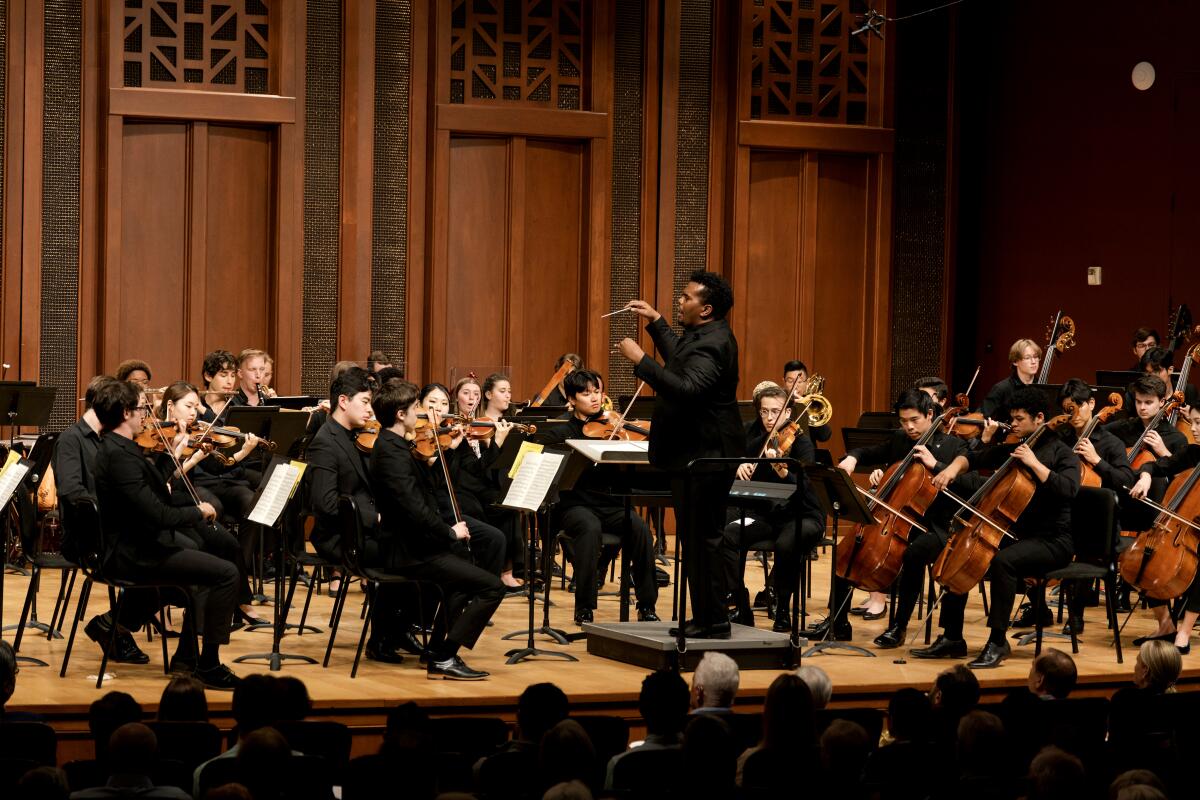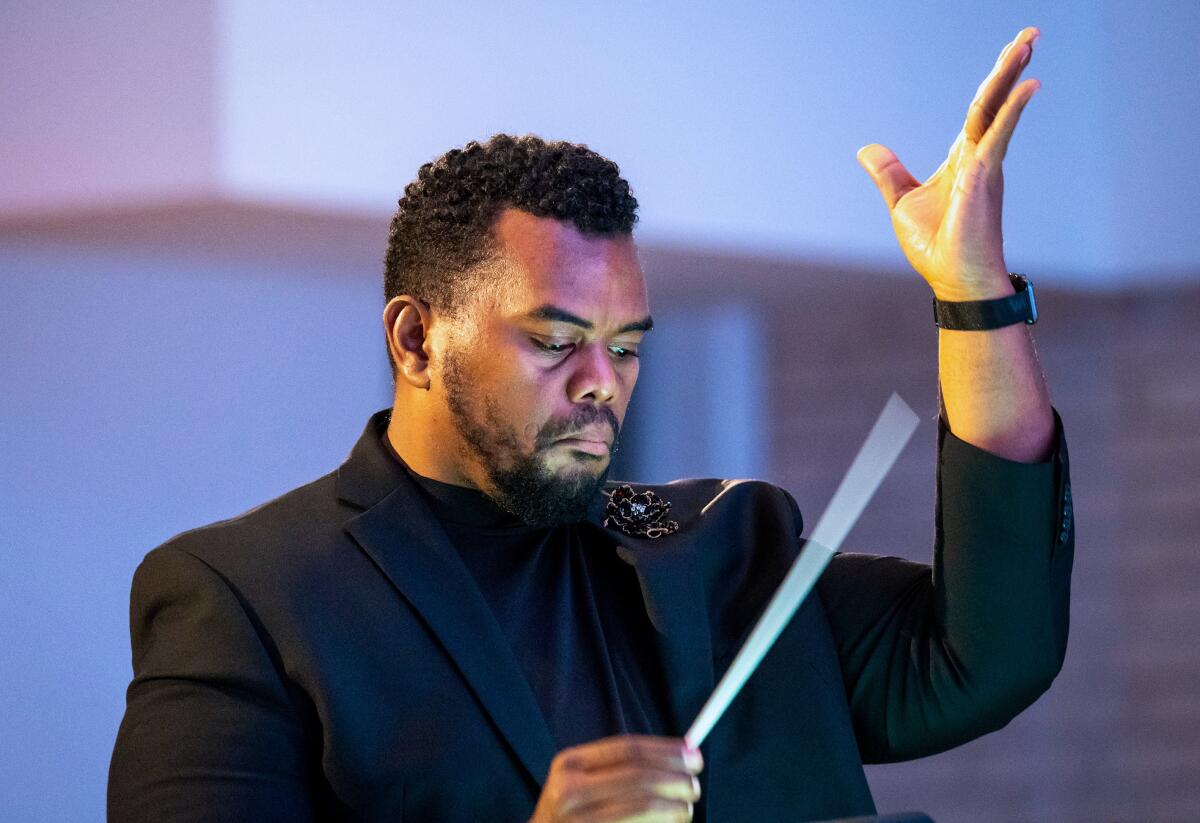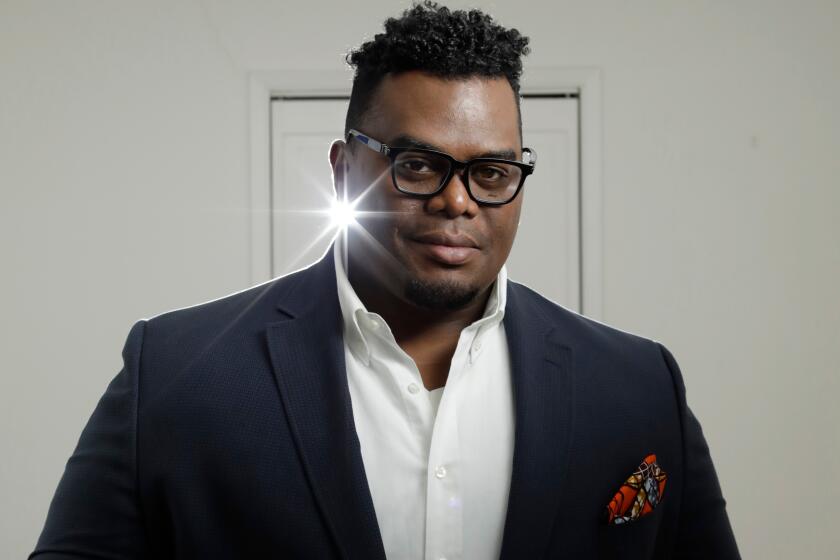In two extraordinary concerts, Anthony Parnther shows why he is a quintessential L.A. musician

- Share via
The Hollywood Bowl was packed Sunday night, as it had reportedly been Friday and Saturday, for the first time that John Williams and Gustavo Dudamel shared a program in the amphitheater. Many in the audience came prepared with lightsabers. In addition to conducting beloved bits from his hit film scores, Williams included “Helena’s Theme,” which he wrote for the new “Indiana Jones and the Dial of Destiny.” This, he has said, will be his last picture. The still vital 91-year-old composer wants to devote his remaining time to concert works, which are increasingly in demand.
Does this mean we’ve come to the end of an epic era of film music? Possibly. But, as was made plain the revelatory night before, Williams’ consequential influence reaches new generations in unexpected ways.
Saturday night Anthony Parnther conducted a stirring concert of a student chamber orchestra at the Music Academy of the West. This is an elite summer training program in Montecito for some of the country’s most promising young musicians, who are housed on gorgeous grounds in a privileged community that Harry, Meghan and Oprah also call home. Eleven days earlier, Parnther led a small ensemble of excellent L.A. musicians to close the season of the new music series Tuesdays @ Monk Space, a small gallery and studio space on the outskirts of Koreatown.
San Bernardino Symphony Orchestra’s new leader has worked with Kanye West and Imagine Dragons. Anthony Parnther wants classical to steal pop’s moves.
These two spaces, musical forces, neighborhoods and audiences were at opposite extremes, but both suited Parnther. He also happens to be a busy studio conductor and bassoonist who has worked over the last two decades on some 1,000 movie, television and video game scores. He is music director of the San Bernardino Symphony and the Southeast Symphony in Los Angeles, serving distinctly different and underrepresented communities. He is a composer and educator. The likes of Ye (formerly known as Kanye West) and RZA of Wu-Tang Clan turn to him for their orchestral needs.
He is, in his exceptional musical reach, the quintessential L.A. musician of our day. And he owes some of that to John Williams. Parnther’s idea of music as a ninth-grader growing up in Virginia, he said in a pre-concert talk Saturday with New Yorker music critic Alex Ross, was the “Star Wars” tunes that kept circling around in his head.
That ultimately led to an impressive education that included studying conducting at Yale. But the Williams lure never left him, drawing him, first as bassoonist, then as conductor, to Hollywood. Among his many credits has been playing on the soundtracks of the last three “Star Wars” films.
The Force has clearly remained with him: Parnther’s two recent concerts were extraordinary. Whether playing for a young new music crowd in the small, acoustically alive, informal Monk Space gallery with a chamber ensemble or for an older, more conservative audience with a full orchestra in the academy’s Hahn Hall, Parnther created an atmosphere of intensity. The effect he gets from any size group conveys the concentration that can be felt in a recording studio. There, with the pressure to produce a recording, the outer world’s distractions recede and the music dominates your full attention.
A thief smashed a car window and took Anthony Parnther’s bassoon, a gift from his late mother. “Sometimes people just don’t realize what they’ve taken.”
Technique at such times is essential, and Parnther is rhythmically exacting the way a studio musician must be — his technique with a baton provides complete confidence. At the same time, he indulges in robustly physical playing and riveting narrative. He enhances this by speaking engagingly to the audience, explaining why he has chosen each work and what it means to him.
The two programs had similarities and differences suited to performers, venue and audience. Both featured Carlos Simon’s “Elegy: A Cry From the Grave.” The six-minute meditation on the tragic deaths of three Black men — Trayvon Martin, Eric Garner and Michael Brown — at the hands of police set the scene at Monk Space for a program Parnther described as “music inspired by courage, strength and resistance to oppression.”
That included the West Coast premiere of Anne Leilehua Lanzilotti’s “with eyes the color of time,” a finalist for the 2022 Pulitzer Prize in music. The Hawaiian composer describes herself as a sound artist, and in her enthralling half-hour score she offers a sonic memorial of otherworldly string sounds inspired by artworks in the Contemporary Museum in Honolulu.
Parnther is conductor of the forthcoming release of the Long Beach Opera recording of Anthony Davis’ potent opera “The Central Park Five,” and at Monk Space he contributed his own effectual short work “The Revolution Will Not Be Televised” for reader and string ensemble. Rather than further accentuating Gil Scott-Heron’s 1970 satirical Black power poem, Parnther underscores the text, robustly delivered by Dwight Trible, with imaginative room to allow it to get under the listener’s skin.

The concert concluded with Shostakovich’s Chamber Symphony in C minor, Rudolf Barshai’s arrangement of the composer’s Eighth String Quartet, written a decade before Scott-Heron’s “Revolution” and in a Soviet Union where the revolution was most certainly not about to be televised. Shostakovich dedicated his quartet to “the victims of fascism and war.” Parnther made it grippingly contemporary.
In Montecito, Parnther settled his audience in with Weber’s overture to “Euryanthe,” which he genially and satirically introduced. Simon’s “Elegy” gracefully followed, but the context turned striking when followed by music from Bernard Herrmann’s score to “Psycho.” Slashing strings create the horror of Alfred Hitchcock’s famed shower scene.
This required conservatory-trained young musicians to get over their endless practicing to make a beautiful sound and, instead, make us squirm. But Herrmann mixed bitter with sweet unlike any other film composer, and the Academy Chamber Orchestra delivered both. Hearing this after Simon’s quietly troubled, half-hopeful elegy proved a stark reminder of just what is at stake in striving for justice.
Once more, Parnther concluded with Shostakovich, here the quizzical Ninth Symphony. Written in 1945 and expected as a glorifying Russian victory symphony, Shostakovich instead wrote a wacky small symphony that begins merrily like Haydn and then alters somber meditations with vulgar dance and drunken celebration.
Shostakovich was the world’s best-known symphonic composer at the time (as Williams is today), and Parnther reminded us that for Russia the defeat of Hitler meant the triumph of Stalin, who was less than happy with this nose-thumbing Ninth. The young musicians played with an earnest zest that led to exuberant zeal.
They were a big band for a chamber music hall, and one that has a robust bass response. The brass and winds would have benefited from being placed on risers, giving more acoustical and theatrical freedom to the stunning, mournful bassoon solos and abandoned brass outbursts.
But Parnther, who could somehow be understated and exceptionally dramatic at the same time, who made humor and pathos two sides of a coin of indeterminate value, kept even a listener well acquainted with the sardonic composer and his symphony guessing. The students were not the only ones, at this terrific concert, getting an education about why music matters, on and off the screen.
More to Read
The biggest entertainment stories
Get our big stories about Hollywood, film, television, music, arts, culture and more right in your inbox as soon as they publish.
You may occasionally receive promotional content from the Los Angeles Times.












